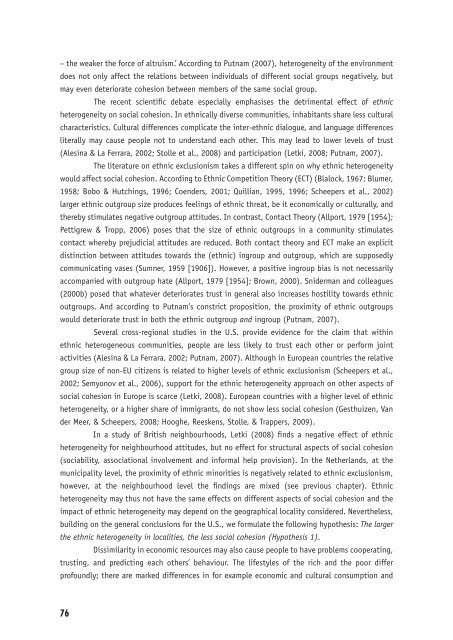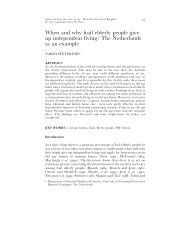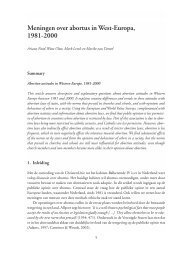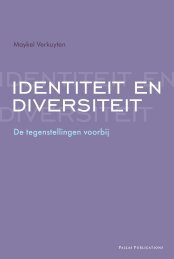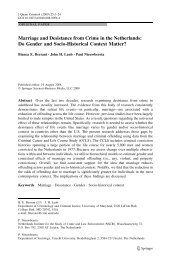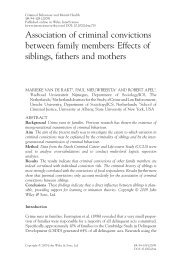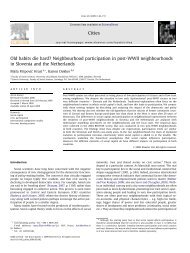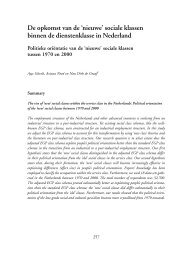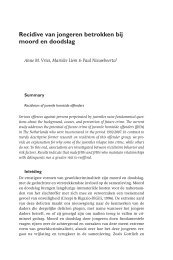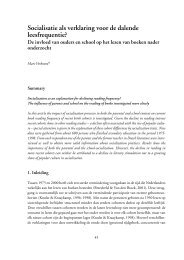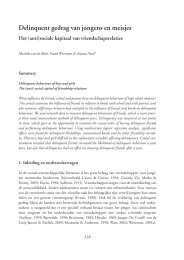Ethnic Hostility among Ethnic Majority and Minority Groups
Ethnic Hostility among Ethnic Majority and Minority Groups
Ethnic Hostility among Ethnic Majority and Minority Groups
You also want an ePaper? Increase the reach of your titles
YUMPU automatically turns print PDFs into web optimized ePapers that Google loves.
– the weaker the force of altruism.’ According to Putnam (2007), heterogeneity of the environment<br />
does not only affect the relations between individuals of different social groups negatively, but<br />
may even deteriorate cohesion between members of the same social group.<br />
The recent scientifi c debate especially emphasises the detrimental effect of ethnic<br />
heterogeneity on social cohesion. In ethnically diverse communities, inhabitants share less cultural<br />
characteristics. Cultural differences complicate the inter-ethnic dialogue, <strong>and</strong> language differences<br />
literally may cause people not to underst<strong>and</strong> each other. This may lead to lower levels of trust<br />
(Alesina & La Ferrara, 2002; Stolle et al., 2008) <strong>and</strong> participation (Letki, 2008; Putnam, 2007).<br />
The literature on ethnic exclusionism takes a different spin on why ethnic heterogeneity<br />
would affect social cohesion. According to <strong>Ethnic</strong> Competition Theory (ECT) (Blalock, 1967; Blumer,<br />
1958; Bobo & Hutchings, 1996; Coenders, 2001; Quillian, 1995, 1996; Scheepers et al., 2002)<br />
larger ethnic outgroup size produces feelings of ethnic threat, be it economically or culturally, <strong>and</strong><br />
thereby stimulates negative outgroup attitudes. In contrast, Contact Theory (Allport, 1979 [1954];<br />
Pettigrew & Tropp, 2006) poses that the size of ethnic outgroups in a community stimulates<br />
contact whereby prejudicial attitudes are reduced. Both contact theory <strong>and</strong> ECT make an explicit<br />
distinction between attitudes towards the (ethnic) ingroup <strong>and</strong> outgroup, which are supposedly<br />
communicating vases (Sumner, 1959 [1906]). However, a positive ingroup bias is not necessarily<br />
accompanied with outgroup hate (Allport, 1979 [1954]; Brown, 2000). Sniderman <strong>and</strong> colleagues<br />
(2000b) posed that whatever deteriorates trust in general also increases hostility towards ethnic<br />
outgroups. And according to Putnam’s constrict proposition, the proximity of ethnic outgroups<br />
would deteriorate trust in both the ethnic outgroup <strong>and</strong> ingroup (Putnam, 2007).<br />
Several cross-regional studies in the U.S. provide evidence for the claim that within<br />
ethnic heterogeneous communities, people are less likely to trust each other or perform joint<br />
activities (Alesina & La Ferrara, 2002; Putnam, 2007). Although in European countries the relative<br />
group size of non-EU citizens is related to higher levels of ethnic exclusionism (Scheepers et al.,<br />
2002; Semyonov et al., 2006), support for the ethnic heterogeneity approach on other aspects of<br />
social cohesion in Europe is scarce (Letki, 2008). European countries with a higher level of ethnic<br />
heterogeneity, or a higher share of immigrants, do not show less social cohesion (Gesthuizen, Van<br />
der Meer, & Scheepers, 2008; Hooghe, Reeskens, Stolle, & Trappers, 2009).<br />
In a study of British neighbourhoods, Letki (2008) fi nds a negative effect of ethnic<br />
heterogeneity for neighbourhood attitudes, but no effect for structural aspects of social cohesion<br />
(sociability, associational involvement <strong>and</strong> informal help provision). In the Netherl<strong>and</strong>s, at the<br />
municipality level, the proximity of ethnic minorities is negatively related to ethnic exclusionism,<br />
however, at the neighbourhood level the fi ndings are mixed (see previous chapter). <strong>Ethnic</strong><br />
heterogeneity may thus not have the same effects on different aspects of social cohesion <strong>and</strong> the<br />
impact of ethnic heterogeneity may depend on the geographical locality considered. Nevertheless,<br />
building on the general conclusions for the U.S., we formulate the following hypothesis: The larger<br />
the ethnic heterogeneity in localities, the less social cohesion (Hypothesis 1).<br />
Dissimilarity in economic resources may also cause people to have problems cooperating,<br />
trusting, <strong>and</strong> predicting each others’ behaviour. The lifestyles of the rich <strong>and</strong> the poor differ<br />
profoundly; there are marked differences in for example economic <strong>and</strong> cultural consumption <strong>and</strong><br />
76


